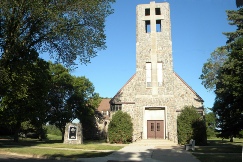
Welcome to
Hope Lutheran Church


Pastor Jon Barsness
Pastor Jon Barsness
Welcome to Hope Lutheran Church! We are a vibrant community of followers of Jesus Christ who are committed to being disciples that make disciples (Matthew 28:19-20).
About Pastor Jon
Pastor Jon was born and raised in Minnesota, Pastor Jon’s journey to ministry happened after spending twenty years in the business world. He pursued theological studies at Grace Christian University, where he earned two master’s degrees in ministry and theological studies.
Vision and Mission
Pastor Jon's vision for Hope Lutheran's vision is rooted in the Great Commission: to make disciples of all nations (Matthew 28:19-20). He is passionate about discipleship, community outreach, and family ministry, believing in the transformative power of the Gospel (Romans 1:16). Under his leadership, we strive to be a church that lives out the call to love one another as Christ loved us (John 13:34-35).
Personal Life
Beyond the pulpit, Pastor Jon enjoys golfing, reading, great coffee, and wineries and breweries, and has a dangerous sweet tooth, all of these things allow him to connect with people from various walks of life. He is married to Anna, and together they have one son, Ethan, who brings joy and inspiration to their lives.
Get in Touch
Pastor Jon is always eager to connect with the congregation and newcomers. Feel free to reach out to him at pastorjonhlsp@gmail.com or join us for our services on Sundays.
Want to connect with Pastor Jon? Stop by during office hours at the church. Email
Pastor Jon at pastorjonhlsp@gmail.com. Call/text Pastor Jon at 612-477-4673. Looking
forward to connecting with members, regular attendees, and guests. Pastor Jon is
in his Hope Lutheran office Mondays and Thursdays from 7:30-Noon.
To easily schedule
a time to meet Pastor Jon, go to this link!
Pastor Jon’s Office Hours
Monday - Bethany-Elim (11:00am - 5:00pm)
Tuesday - Bethany-Eilm (8:00am - Noon)
Wednesday - Hope (11:00am - 5:00pm)
Thursday - Hope (9:00am - 1:00pm)
Friday - Day off
YouTube – You Bet-cha!
Did you miss last Sunday’s message or want to revisit another sermon? Our church’s YouTube
channel is the perfect way to stay connected! You’ll find videos of past sermons, special announcements, and our weekly video Devotional plus highlights from recent events, like our Wednesday night F.U.E.L gatherings. Make sure to subscribe to the channel and turn on notifications so you never miss out on new content! Whether you're catching up or sharing with a friend, this is a great way to experience what God is doing in our community. Find us at https://www.youtube.com/@HopeLutheranMinneota and join the conversation online!



Hope Lutheran - Minneota
Bethany-Elim - Ivanhoe
St. Paul’s -
Minneota
Message from Pastor Jon
Our Only Infallible Rule
At the time of the sixteenth-century Protestant Reformation, one of the key points of dispute between the Reformers and the Roman Catholic Church was related to the doctrine of Scripture. To be more specific, the Reformers taught the doctrine of sola Scriptura, or Scripture alone. The use of the word sola indicates that they were affirming that there is something unique about the Scriptures. But what is it that is true only of Scripture? The Holy Scriptures are the only rule of faith and obedience. Why? Because the Holy Scriptures are the Word of God. That is the fundamental point of the doctrine of sola Scriptura – namely, that Scripture has the authority of God whose Word it is, and God’s authority is infinitely higher than any human authority because God is God and humans are not. In other words, the doctrine of sola Scriptura ultimately rests on the distinction between the Creator and His creatures.
There remain many misunderstandings of the doctrine of sola Scriptura and its implications. There are, for example, those who believe that Scripture’s ultimate divine authority rules out the existence of any subordinate human authorities. In such a view, not only is Scripture the ultimate and final authority, but it is the only authority at all. There remains no place for ecclesiastical authority or creedal authority. Sola Scriptura, according to those who hold this view, is diametrically opposed to any positive use of traditional teaching or practice. It is important to understand that this concept of sola Scriptura is not the doctrine taught by the early Reformers. It is a serious distortion of that doctrine, influenced more by post-Enlightenment philosophies than by the theology of the Reformation.
For the Reformers, the doctrine of sola Scriptura meant that Scripture is the final authoritative norm for faith and life and that Scripture is to be interpreted in and by the church. The Reformers did not deny that the church and its creeds have any real authority. They denied that the church and its creeds have the same kind of authority that God has. The Reformers distinguished God’s ultimate divine authority from subordinate human authorities.
To understand why they saw no conflict, it is necessary to recognize what a creed or a confession is and how such writings differ from the writings that we find in the Bible. The writings that we find in the Bible are unique because they are the very Word of almighty God. In 2 Timothy 3:16, we read that “all Scripture is breathed out by God.” Other translations read, “All Scripture is inspired.” This is where we get the technical theological term inspiration. The doctrine of inspiration is a translation of the Greek word theopneustos, which literally means “God-breathed.” It is an assertion that the words of Scripture are not merely human words. Yes, they are the words of men such as Moses and Paul, but ultimately these words are God’s words. They are God-breathed. Their ultimate source is the mouth of God. Therefore, the words of Scripture carry the very authority of God.
Creeds and confessions, on the other hand, are not theopneustos. They are not God-breathed. They are man-breathed. They are human statements of faith. The word creed comes from the Latin credo, which simply means “I believe.” Credimus means “We believe.” Everybody has a creed, whether they call it a creed or not. Even those who say, “I believe in no creed but Christ” or “I believe in no creed but the Bible” have a creed. Their words “I believe” indicate the existence of their creed.
Creeds are subordinate to and dependent on Scripture. If there is no Scripture, there is no creed. In a creed, the church is corporately stating what it believes that God’s inspired Word teaches. It is a faithful response to the divinely authoritative teaching of Holy Scripture. Scripture is God saying, “Thus says the Lord.” A creed is the people of God saying, “We believe You, Lord.”
My prayer is that you are daily in the Word of God, resting on His Word to learn more and more about who God is.
~Pastor Jon

| New to Hope |
| Contact Us |
| Pathway |
| Groups |
| Serve |
| Come + See |
| Come + Follow Me |
| Come + Be With Me |
| Remain In Me |
| Men of Hope |
| Women of Hope |
| 50 + Ministry |
| Young Adult Ministry |
| GLOW |
| IGNITE |
| FUEL |
| TEEN POWER |
| Scholarships |
| Minneota Area Mission |
| Hope's Calendar |